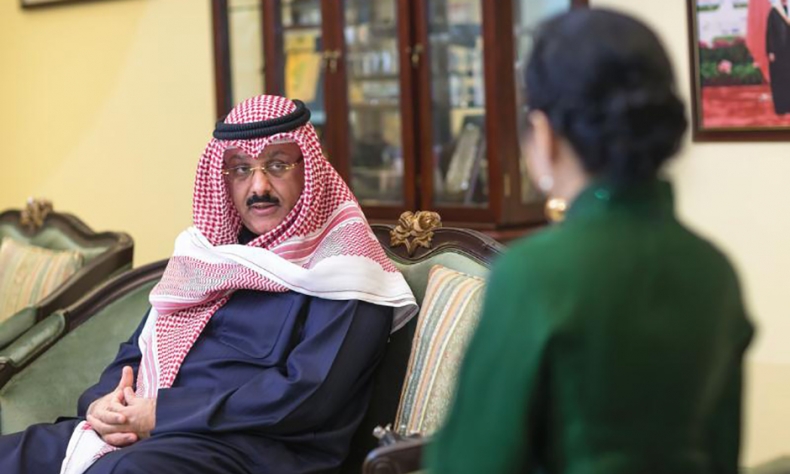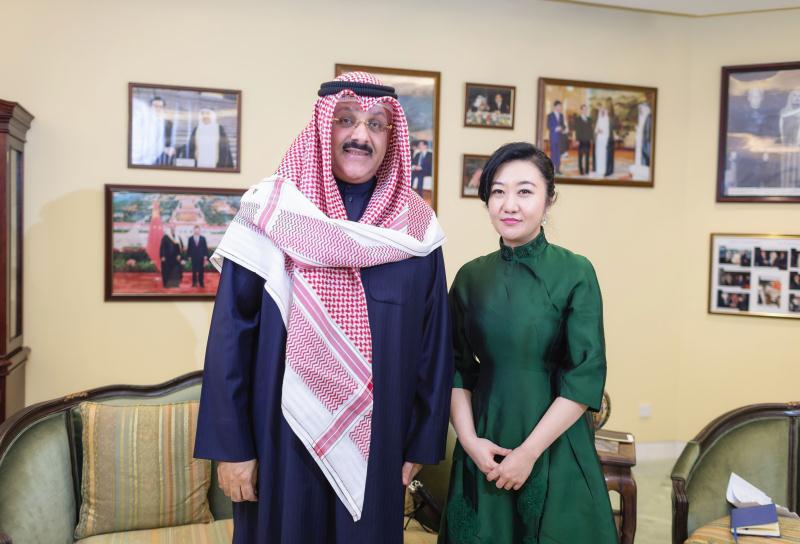
【Ambassador Interview】Kuwaiti Ambassador to China: A New Chapter to Strengthen China-Kuwait Relations. A New Chapter for Cooperation.
“On the first day I came to China, I called all my diplomatic staff, Kuwaiti petroleum companies which have investment in China and all our people who work in your beautiful country. I told them that this is a new chapter with China. A new chapter for the future. A new chapter for cooperation. A new chapter to strengthen our relations.”
The Conference on Dialogue of Asian Civilizations, held on May 15-22 in Beijing, is the most important diplomatic event of the year hosted in China. China Focus, together with DRTT (Development Research Think Tank of China) Group and China Development Observation, has launched a series of in-depth columns titled “Ambassador Interview” to show you the point of view of the ambassadors of the Asian countries on the theme of the harmonious co-existence of various civilizations. Today we have an exclusive interview with Sameeh Essa Johar Hayat, Ambassador of Kuwait to China.

“Kuwait Is Ready to Work with China to Seek Development.”
Sun Chao: 2019 marked the 48th anniversary of China-Kuwait diplomatic relations. We will never forget that Kuwait was the first Gulf country to establish diplomatic relations with China in 1971. Since then, we have developed a deep friendship. Do you have any plans to further develop this bilateral relationship?
Sameeh Essa Johar Hayat: It’s a great question. On the first day I came to China, I called all my diplomatic staff, Kuwaiti petroleum companies which have investment in China and all our people who work in your beautiful country. I told them that this is a new chapter with China. A new chapter for the future. A new chapter for cooperation. A new chapter to strengthen our relations.
People in Kuwait haven’t forgotten China’s stance when Kuwait was invaded in 1990. You were part of the United Nations to liberate Kuwait in 1991. Because of that, every single citizen of Kuwait will remember China.

My duty here is to strengthen the relationship between our two countries, mainly in investment, infrastructure, energy, security, telecommunication, culture and health care. Before I came here, I gathered information about China by talking with high-ranking officials in my country. I spent three weeks in Kuwait, meeting with the head of State, prime minister, his deputies, foreign minister, defense minister, all the cabinet members, all the heads of the institutions of investment, and leaders of greatest companies of Kuwait. Now I am making use of these information and data to seek for cooperation opportunities.
My work is to match the different interests of the two countries and to build a stronger partnership. Kuwait is ready to work with China to seek development amid the complicated and volatile international environment.
To use an analogy, my work is like the game of Lego. I match different parts from Kuwait and China and help to build a strong relationship between the two countries.

“Silk Cities” and “Vision 2035”
Sun Chao: The Belt and Road Initiative was put forth by President Xi Jinping in 2013. Since then, this initiative has attracted attention and understanding at home and abroad. So I am wondering what is your opinion of the initiative?
Sameeh Essa Johar Hayat: This initiative was put forward in September, 2013. We are among the first countries which signed the memorandum of understanding for cooperation with China in this important initiative. We support this initiative 100 percent. We are looking forward to working with you hand in hand, shoulder by shoulder, to seeing this initiative come into reality. Almost 70 Chinese companies are now working in Kuwait and we are also investing billions of dollars in China. The exchanges between us will further grow with the initiative.
Because of its geographical location, Kuwait is the linking bridge and transportation line of the BRI. We are willing to cooperate with China to build new infrastructure in Kuwait, including new bridges, hospitals, universities and streets. By 2030, we plan to spend 270 billion dollars to build the smart cities. We also hope to build silk cities. The silk cities will need infrastructure, housing, electricity, water access, solar and so on. We hope that Chinese enterprises will come and participate in the construction.

Sun Chao: Building a silk city in the Northern coastal area is the core of the project “Kuwait Vision 2035”. What is the master plan? How to connect “Vision 2035” and the BRI?
Sameeh Essa Johar Hayat: They are closely connected. We are implementing “Vision 2035” as a country along one of the Belt and Road routes. One of the projects we are developing now is to build the biggest port in the north of Kuwait, which will help connect transportation routes for the Silk Road. What is our interest in doing this? It is part of our culture. Before discovering oil, we were in the trade business. I come from a business family. My great grandfathers and uncles took their booms to the ocean and dived for pearls. Then they sold pearls to India in exchange for goods which they then sold to other regions. So we have a tradition of doing business with neighboring countries. Now we hope to revive this tradition by building transportation routes.
The Belt and Road is also part of our culture. It links Kuwait with China and other countries, taking advantage of each country’s strength and benefiting our people. It will be a win-win initiative. That’s why we look forward to working with China to put this initiative into action.
In Kuwait, many organizations have participated in the BRI, including foreign communication and investment organizations, oil and energy companies.
Sun Chao is the editorial board member of China Development Observation, Vice President of DRTT Group, and author of New Order: Ambassadors’Views on the Belt and Road Initiative.
 Facebook
Facebook
 Twitter
Twitter
 Linkedin
Linkedin
 Google +
Google +









